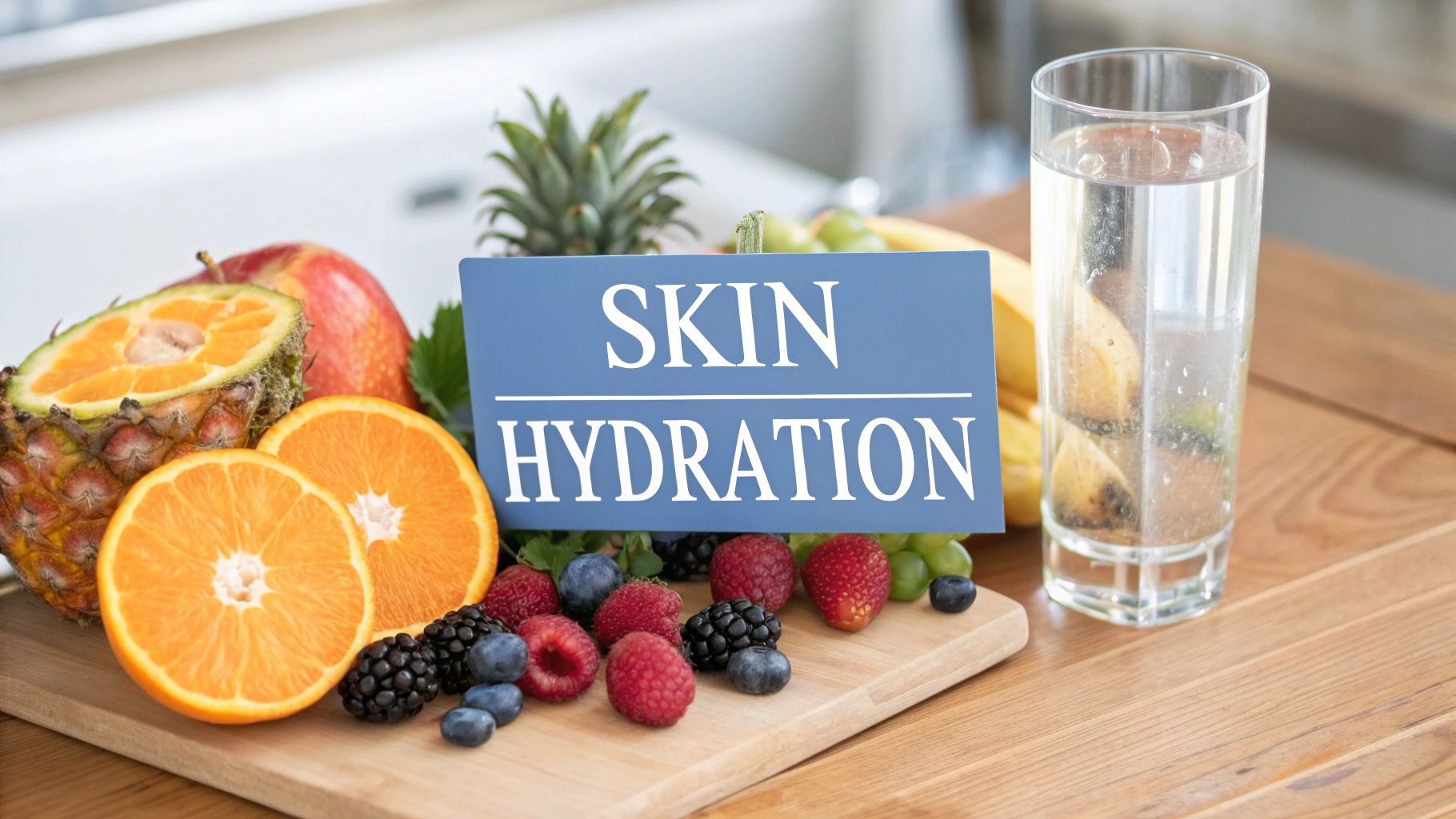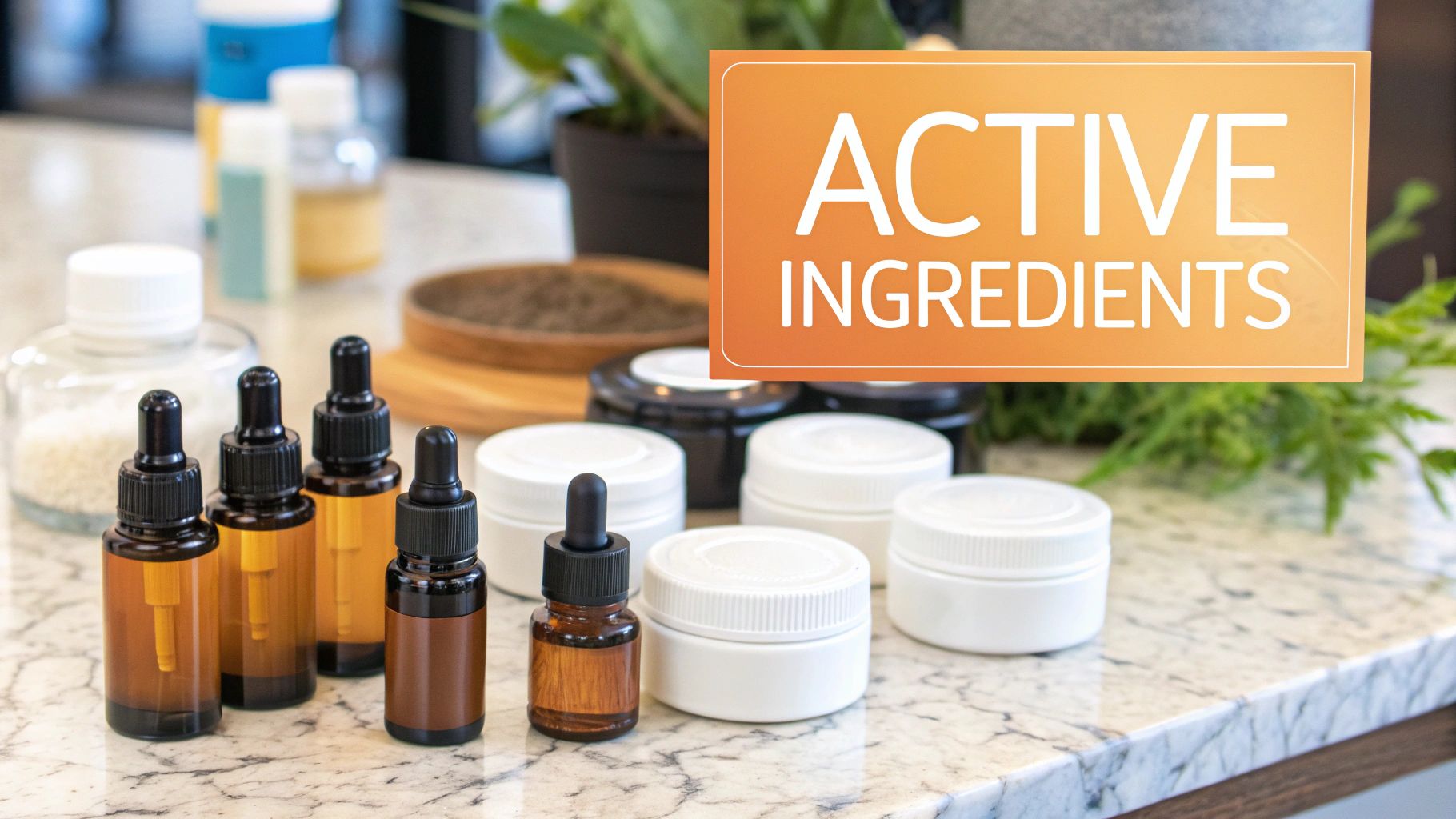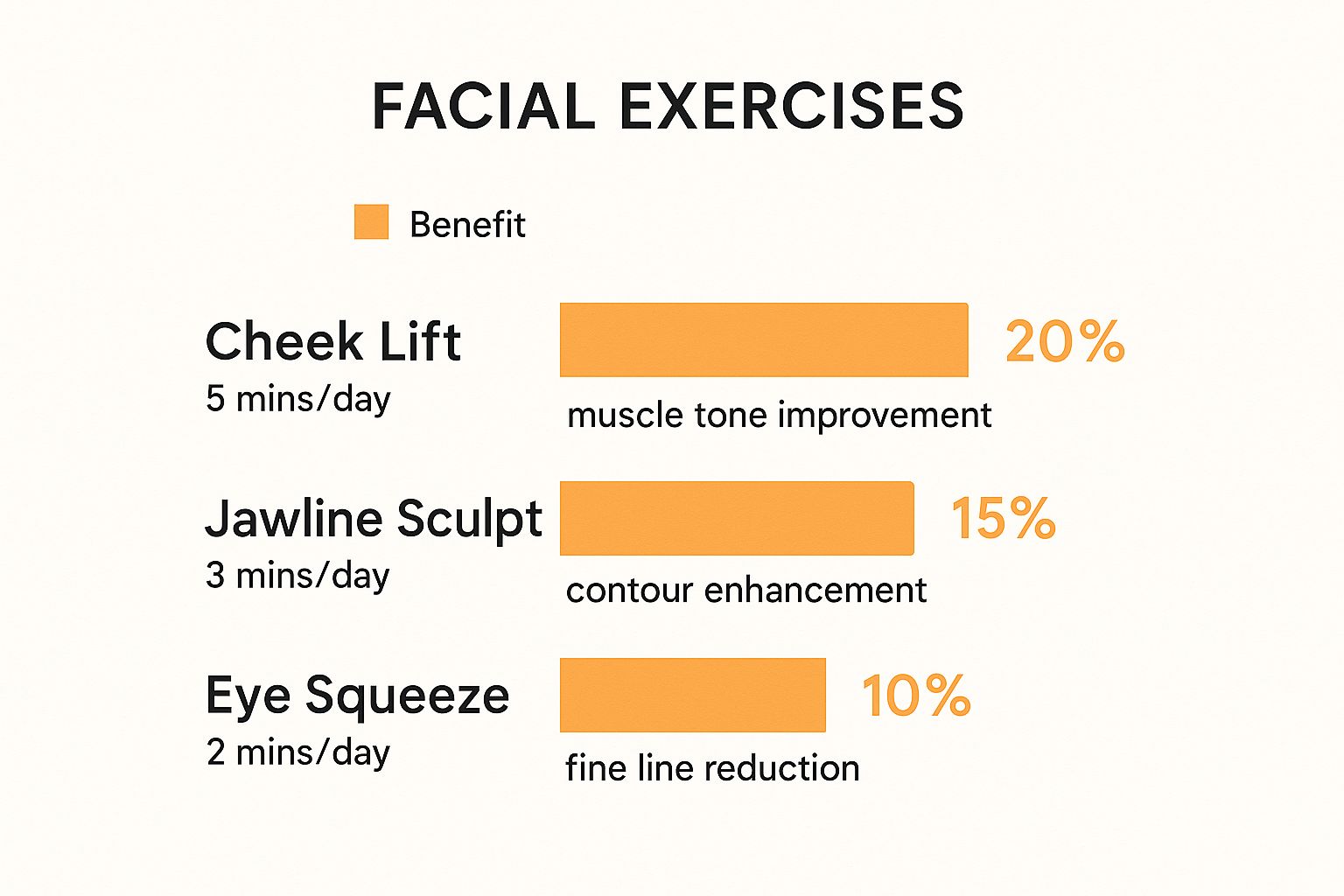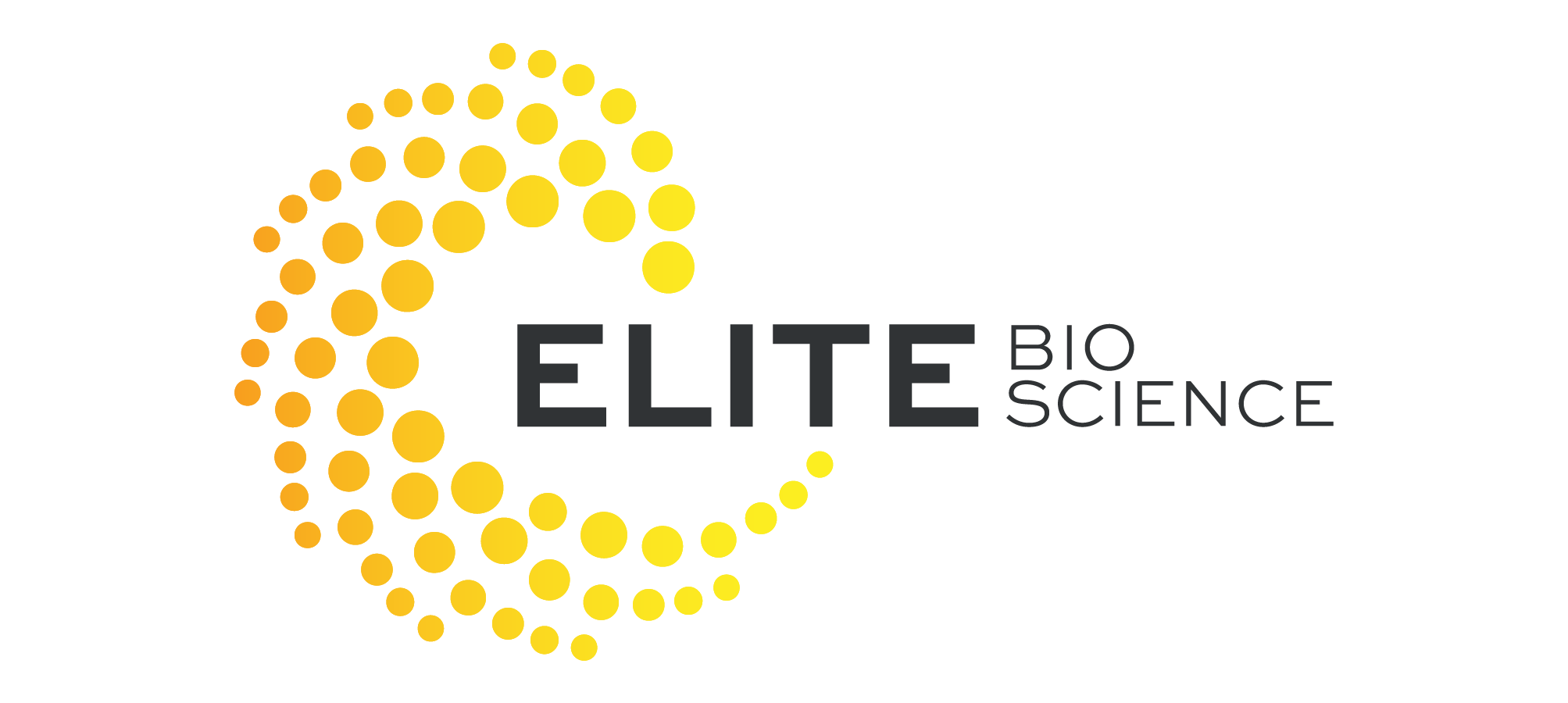Improving your skin's elasticity really comes down to a two-part game plan: protecting the collagen and elastin you already have from getting wrecked, and nudging your body to make more of these powerhouse proteins. It’s not about one magic bullet, but a smart mix of targeted nutrition, the right skincare, and certain lifestyle habits that all work together to bring back your skin's natural firmness and bounce.
The Science of Skin Bounce and What Weakens It
To get that spring back in your skin, you first have to understand what it is and why it disappears. Think of your skin’s structure like a high-quality mattress. The springs that give it firmness and let it snap back are two critical proteins tucked away in your dermis (the middle layer of your skin): collagen and elastin.
Collagen is the framework—it provides the structure and strength. Meanwhile, elastin is all about stretch and resilience. When we're young, our bodies are collagen and elastin factories, churning them out in huge amounts. This keeps our skin firm, plump, and able to bounce back instantly. But as we get older, that internal production line naturally starts to slow way down.
Key Factors That Reduce Skin Elasticity
On top of the natural slowdown, a few internal and external culprits speed up the breakdown of our skin's supportive proteins, making it lose its springiness over time.
The biggest offenders include:
- The Natural Aging Process: As we get older, the cells in charge of making collagen (called fibroblasts) become less active and fewer in number. Blood flow to the skin also decreases, meaning fewer nutrients get delivered to keep that factory running.
- Sun Exposure: UV radiation is, without a doubt, the number one enemy of skin elasticity. It fires up free radicals that actively chew through your existing collagen and elastin fibers in a process we call photoaging.
- Lifestyle Choices: Everyday habits like smoking or eating a diet high in sugar can do a real number on your skin's firmness. Sugar, through a process called glycation, creates nasty molecules that latch onto collagen and elastin, making them rigid, brittle, and weak.
This decline isn't just a personal concern; it’s becoming a major global focus as our population ages. The number of people aged 60 and older is expected to hit around 2 billion by 2050. This demographic shift means skin health is becoming a much bigger piece of the overall wellness puzzle. You can learn more about how an aging population is shaping skin health research from findings published by the National Center for Biotechnology Information.
Key Insight: Getting your skin's bounce back isn't about finding a single "miracle" product. It's about a consistent, multi-pronged strategy that shields your skin’s structural proteins from every angle while encouraging new growth. Once you understand what causes the decline, you can make targeted changes that deliver real, lasting results.
Eating Your Way to More Elastic Skin
While what you put on your skin is important, what you put on your plate plays an equally powerful role in building resilient, firm skin from the inside out. You can’t build a strong house with flimsy materials, and the same goes for your skin. Improving elasticity isn't just about topical creams; it's about giving your body the raw materials it needs to repair and rebuild.
A diet packed with specific nutrients acts as your internal support system for producing collagen and elastin. This goes beyond vague "healthy eating" advice. We're talking about strategically choosing foods that directly fuel your skin’s construction crew with the best possible building materials.
Fueling Your Skin with Essential Nutrients
To truly support your skin's structure, some vitamins and minerals are simply non-negotiable. These nutrients are critical for synthesizing new collagen fibers and protecting the collagen you already have from breaking down.
Think about incorporating these into your daily routine:
- Vitamin C: This is an absolute superstar for collagen synthesis. Without enough vitamin C, your body’s collagen production line grinds to a halt. You can find it in abundance in citrus fruits, bell peppers, strawberries, and broccoli.
- Antioxidant-Rich Foods: Berries, leafy greens like spinach and kale, and even high-quality dark chocolate are loaded with antioxidants. These compounds are your skin's bodyguards, neutralizing the free radicals from sun and pollution that actively destroy collagen and elastin.
- Healthy Fats: Foods rich in omega-3 fatty acids—think salmon, avocados, and walnuts—are essential for maintaining your skin’s lipid barrier. A strong, healthy barrier keeps skin hydrated and plump, which is crucial for a firm, supple appearance.
Integrating these foods isn’t about a restrictive diet, but about making smart, consistent additions. Swapping a processed snack for a handful of almonds or adding berries to your morning yogurt can make a real difference over time. For more tips on how to support your body's natural production, check out our guide on the natural ways to boost collagen.
To make it even clearer, here’s a breakdown of the key nutrients you should focus on.
Key Nutrients for Enhancing Skin Elasticity
This table outlines the essential vitamins and minerals, their specific roles in skin health, and the best food sources to add to your grocery list.
| Nutrient | Role in Skin Elasticity | Top Food Sources |
|---|---|---|
| Vitamin C | Absolutely essential for collagen synthesis; protects against oxidative stress. | Citrus fruits, bell peppers, strawberries, broccoli, kiwis. |
| Vitamin E | A potent antioxidant that protects cell membranes from free radical damage. | Almonds, sunflower seeds, spinach, avocados, sweet potatoes. |
| Zinc | Acts as a cofactor for enzymes involved in collagen and elastin production. | Oysters, beef, pumpkin seeds, lentils, chickpeas. |
| Copper | Crucial for linking collagen and elastin fibers together, creating strong skin. | Shellfish, nuts, seeds, whole grains, dark leafy greens. |
| Omega-3 Fatty Acids | Maintain the skin's lipid barrier, keeping it hydrated and supple. | Salmon, mackerel, walnuts, chia seeds, flaxseeds. |
| Polyphenols | Powerful antioxidants that protect existing collagen from degradation. | Berries, green tea, dark chocolate, red wine, grapes. |
By consistently incorporating these foods, you're not just eating well—you're strategically feeding your skin exactly what it needs to stay firm and youthful.
The Role of Hydrolyzed Collagen Supplements
Beyond whole foods, one of the most direct and well-researched methods for improving skin elasticity is through supplementation. Oral hydrolyzed collagen supplements give your body small, easily absorbed peptides—the literal building blocks of new collagen.
This isn't just theory; the clinical data is compelling. A 2022 study published in the Journal of Clinical and Aesthetic Dermatology found that after just 56 days of daily collagen intake, 58% of participants saw a significant improvement in skin firmness. Softness also improved for 54% of participants, and wrinkle depth was noticeably reduced.
Key Takeaway: While a nutrient-dense diet lays the foundation for healthy skin, targeted supplementation with hydrolyzed collagen can provide a concentrated dose of the specific amino acids needed to visibly improve skin firmness, softness, and overall elasticity within a few months.
Building a Skin-Firming Topical Routine

While a nutrient-rich diet builds firm skin from the inside out, a well-chosen topical routine provides direct, external support. Applying the right active ingredients is your secret weapon for both protecting the collagen you have and kickstarting new production. This is where your daily skincare choices become a powerful tool in your game plan for better skin elasticity.
Your bathroom counter should be stocked with ingredients that are scientifically proven to make a real difference. We're not just talking about basic moisturizers; these are functional products designed to interact with your skin at a cellular level.
The Foundational Actives for Firmer Skin
Let's start with the non-negotiables. These three ingredients are the backbone of any effective skin-firming regimen, each playing a distinct yet complementary role in your skin’s health.
- Retinoids (Vitamin A): This is the gold standard for promoting cell turnover and ramping up collagen synthesis. Retinoids, which include both over-the-counter retinol and prescription-strength tretinoin, work by binding to receptors in your skin cells, essentially telling them to behave like younger, healthier cells.
- Vitamin C (L-Ascorbic Acid): Think of a daily vitamin C serum as your skin's primary defense shield. As a potent antioxidant, it neutralizes the collagen-degrading free radicals from UV rays and pollution. It's also a critical cofactor in the collagen-building process itself.
- Hyaluronic Acid: While it doesn't build new collagen, hyaluronic acid is a moisture magnet. It's famous for its ability to hold up to 1,000 times its weight in water, which provides an immediate plumping effect that makes skin appear firmer and smooths out the look of fine lines.
These actives work beautifully together. For instance, a smart morning routine might involve a vitamin C serum for protection, followed by hyaluronic acid and, of course, sunscreen. Your evening routine then becomes the perfect time for a retinoid to get to work repairing and rebuilding while you sleep.
The Power of Peptides in Your Routine
Once you have the fundamentals down, it's time to bring in the sophisticated communicators of skincare: peptides. These are short chains of amino acids that act as messengers, signaling your skin cells to perform specific jobs, like producing more collagen.
Key Insight: Think of peptides as tiny project managers for your skin. They can tell your cells to "build more collagen here" or "slow down the breakdown of existing elastin," making them a cornerstone for anyone serious about improving skin elasticity.
Because there are so many different types, peptide products can be highly targeted. Some peptides excel at firming, while others are geared toward smoothing wrinkles or repairing the skin's barrier. Adding a peptide serum or moisturizer into both your morning and evening routines can seriously amplify your results. To go deeper, you can explore our detailed guide covering the role of peptides for skin rejuvenation.
Recent research has really underscored how effective these compounds are. Bioactive peptides have been shown to activate key signaling pathways that not only boost collagen but also suppress the enzymes that break it down. Certain peptides can even strengthen the skin barrier and speed up tissue repair. You can explore the science behind this in research on collagen-derived bioactive substances.
Everyday Habits That Protect Your Skin's Firmness

While targeted skincare and nutrition are fantastic for building new collagen, your daily habits are what ultimately protect that investment. Think of it this way: you can build a beautiful house, but if you don't shield it from the elements, it’s going to weaken over time.
These simple, consistent lifestyle choices are your first line of defense against the very things that break down skin elasticity. They're a non-negotiable part of any serious firmness-focused strategy.
Make Sun Protection a Non-Negotiable
If you do only one thing for your skin's firmness, make it this. Daily, year-round sun protection is hands-down the most effective way to prevent the breakdown of your collagen and elastin. UV radiation unleashes a cascade of damage that makes your skin’s supportive proteins brittle and weak.
This means applying a broad-spectrum sunscreen with at least SPF 30 every single morning, no matter the weather. Rain or shine. Reapply every two hours if you’re spending time outdoors, sweating, or after a swim. This one simple habit prevents future damage and preserves the elasticity you’re working so hard to build.
Understand the Impact of Glycation and Stress
Your lifestyle can either support or sabotage your skin. Two of the biggest culprits that quietly wreck your skin’s structure are excess sugar and chronic stress.
- Limit High-Sugar Foods: When you eat too much sugar, it triggers a process called glycation. In simple terms, sugar molecules latch onto proteins like collagen and elastin, creating harmful new molecules that make your skin's support system rigid and inflexible.
- Manage Cortisol Levels: Chronic stress keeps your body in a constant state of high alert, flooding your system with the stress hormone cortisol. Studies have shown that elevated cortisol directly breaks down collagen and elastin, compromising your skin’s firmness and bounce.
Prioritize Hydration and Quality Sleep
Simple routines like drinking enough water and getting proper rest have a direct, measurable impact on your skin's resilience. These aren't just wellness platitudes; they're fundamental to your skin’s biological health.
Proper hydration keeps your skin cells plump and functioning at their best, which contributes to a firm, supple appearance. Dehydration, on the other hand, can make skin look lax and emphasize fine lines almost instantly.
Key Insight: Quality sleep is your skin’s dedicated repair cycle. During deep sleep, your body ramps up the production of human growth hormone, which is essential for repairing damaged cells and producing new collagen. Aiming for 7-9 hours of quality sleep per night is a powerful, free tool for improving skin elasticity.
When your at-home skincare routine and lifestyle tweaks aren't quite getting you the firmness you're after, it might be time to look at what the professionals can offer. In-office treatments can deliver a much bigger punch, working on a deeper level than any cream or serum ever could. They go straight to the source, stimulating the skin's underlying structure to make a real, noticeable difference in elasticity.
Of course, this isn't a one-size-fits-all situation. The right treatment for you is going to depend on your specific concerns, your skin type, and what you’re hoping to achieve. The first and most important step is always a good, honest chat with a qualified dermatologist or licensed esthetician to map out a plan that makes sense for you.
Let's take a look at some of the most popular and effective options available today.
Energy-Based and Resurfacing Procedures
Many of the most effective treatments work by using controlled energy or creating a tiny, targeted injury to the skin. This might sound a little scary, but it’s actually a brilliant way to kickstart your skin's own natural healing and repair mechanisms. This controlled response is what triggers a surge in new, healthy collagen production.
Some of the leading options include:
- Radiofrequency (RF) Therapy: This procedure uses energy waves to gently heat the deeper layers of your skin. This heat gives you an immediate tightening effect by causing existing collagen fibers to contract, but the real magic happens over time as it stimulates long-term collagen growth for ongoing improvement.
- Microneedling: You might have heard this called collagen induction therapy. It involves creating thousands of microscopic punctures in the skin. Your body sees these as tiny injuries and rushes to heal them by churning out fresh collagen and elastin, leaving you with smoother, firmer skin.
- Laser Resurfacing: This is a more intensive option. Some lasers remove the outer layer of skin (ablative), while others heat the underlying tissue without removing the surface (non-ablative). Both methods trigger a powerful healing response that dramatically ramps up collagen for better texture and tightness.
- Chemical Peels: In this treatment, a chemical solution is applied to the skin, causing it to exfoliate and eventually peel off. The fresh, new skin underneath is typically smoother, less wrinkled, and more even in tone. The results you get depend on the strength of the peel.
Along with professional treatments, simple at-home practices like facial exercises can help support the muscle tone that provides a foundation for your skin.

As you can see, even a small, consistent daily effort can lead to noticeable improvements in the underlying muscle, which in turn helps support the skin on top.
Comparing Professional Skin Firming Treatments
Navigating the world of in-office treatments can be overwhelming. To help you get a clearer picture, this table compares some of the most popular options, giving you a quick look at how they work, what they're best for, and what to expect in terms of downtime.
| Treatment | How It Works | Best For | Average Downtime |
|---|---|---|---|
| Radiofrequency (RF) | Uses energy waves to heat deep skin layers, stimulating collagen. | Overall skin tightening and firming with minimal downtime. | 0-1 day of mild redness. |
| Microneedling | Creates micro-injuries to trigger the body's natural healing response. | Improving texture, fine lines, and mild laxity. | 1-3 days of redness and sensitivity. |
| Laser Resurfacing | Uses focused light to remove outer skin layers or heat underlying tissue. | Significant texture issues, deep wrinkles, and sun damage. | Varies from 3-10+ days, depending on intensity. |
| Chemical Peels | Applies a solution to exfoliate the skin and reveal a new layer. | Improving skin tone, fine lines, and surface imperfections. | Varies from 0-7 days, depending on peel depth. |
This comparison should give you a starting point for your conversation with a professional. Remember, the best choice is always a personalized one.
Key Consideration: The cost, downtime, and number of sessions needed can vary dramatically. A light chemical peel might have you back to normal the next day, while an ablative laser could mean a week or more of dedicated recovery time.
It’s so important to go into any procedure with a realistic understanding of what to expect. Having a frank discussion with your provider about recovery, potential side effects, and the expected timeline will ensure you’re fully prepared. To get a sense of what's on the horizon in aesthetic medicine, it's worth reading about the anti-aging treatment trends to watch out for this 2024. Arming yourself with this knowledge helps you ask all the right questions and make the best choice for your skin.
Got Questions About Skin Elasticity? We’ve Got Answers.

When you're trying to figure out how to improve skin elasticity, a lot of questions come up. It's a journey that often means cutting through marketing hype to get to the scientific truth.
Let's tackle some of the most common questions I hear. My goal is to give you direct answers so you can move forward with confidence and realistic expectations.
How Long Does It Really Take to See a Difference?
This is the big one, and the honest answer is: be patient. Improving skin elasticity isn't an overnight fix; it’s a marathon that works with your body's natural repair cycles. You’re asking your body to build new structural proteins, and that takes time.
Here’s a realistic breakdown of what to expect:
- Oral Collagen Supplements: You'll likely notice the first signs—better hydration and a subtle plumpness—within 4-8 weeks. The deeper, structural firmness you’re really looking for often becomes more visible after 3 to 6 months of daily use.
- Topical Actives: For heavy hitters like retinoids, you need to give them 3-6 months to see a real change in texture and firmness. They are working on a cellular level to remodel the skin, which is a gradual process.
- Lifestyle Changes: The payoff here is cumulative and long-term. Using sunscreen daily, for example, prevents future damage. The "results" become obvious years down the line when your skin has aged far more gracefully than it would have otherwise.
Remember, your personal timeline will always be unique, shaped by your age, genetics, and how consistent you are with your routine.
Can Skin Regain Elasticity After Major Weight Loss?
This is a really common concern, and the answer isn't a simple yes or no. How well your skin bounces back after significant weight loss depends heavily on a few key factors: your age, the amount of weight lost, and your genetic predisposition for skin resilience.
Younger skin just has more of the biological machinery needed to retract naturally. While you might not get back to 100% of your skin's original state with at-home methods alone, the strategies we've discussed can make a huge difference.
Key Insight: The best results come from a combined approach. Think nutrient-dense foods, targeted collagen and peptide supplements, and a skincare routine featuring retinoids. This combination gives your skin the support it needs to retract. For more significant laxity, especially on the arms or abdomen, professional treatments or surgery are often the most effective paths forward.
Are There Any Miracle Overnight Products?
In a word: no. Be extremely wary of any product claiming it can permanently restore skin elasticity overnight. It's just not biologically possible.
Now, some ingredients can give you a temporary "Cinderella effect." Hyaluronic acid is the most famous for this. By pulling massive amounts of water to the skin's surface, it can make your skin look and feel noticeably firmer for a few hours.
But this is a cosmetic illusion, not a structural change. True, lasting improvement comes from stimulating your body to create new collagen and elastin, a process that takes months of consistent, science-backed effort. There are no shortcuts.
Does Facial Yoga Actually Do Anything?
The jury is still very much out on facial yoga. Its effectiveness is a hot topic, but it lacks strong scientific evidence to back it up.
Proponents believe that by toning the muscles under the skin, you create a "scaffolding" that lifts the skin on top. On the flip side, many dermatologists argue that the repetitive facial movements could actually contribute to expression lines and wrinkles over time.
The bottom line is that building muscle under the skin doesn't directly increase the amount of collagen or elastin in the skin. Your time and energy are better spent on strategies proven to improve the health of the dermis itself—like targeted skincare, proper nutrition, and diligent sun protection.
At Elite Bioscience, we provide targeted peptide and vitamin therapies that support your body's natural regenerative processes from the inside out. Our science-backed protocols are designed to promote skin health, firmness, and overall vitality. Explore our personalized treatment options and take the next step in your wellness journey by visiting Elite Bioscience.







